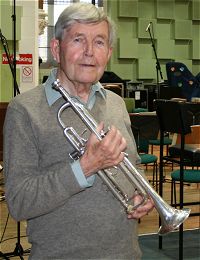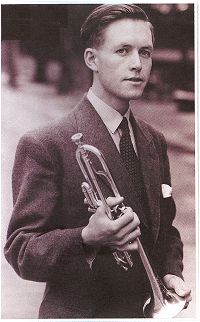King
Arthur
An heir to the tradition
of Elgar and Vaughan Williams, Arthur
Butterworth is British musical royalty.
Lynne Walker meets him
 At
the age of 85 most composers might
expect to celebrate their birthday
with a glass of fizz or, if their
background is in brass, a bottle
of quality beer. Arthur Butterworth
may well do that on 4 August but
prior to this he has been back among
the brass players with whom he began
his career in music. It was 1958
when, as a trumpeter with the Hallé,
he played in Vaughan Williams’ London
Symphony at the Cheltenham Festival,
in the presence of the composer
who died barely a month later. Fifty
years on Butterworth was invited
to take up his trumpet once more
for a performance of the same work
by the Settle Orchestra which he
helped to found. ‘It was so ingrained
in my recollection of rehearsing
and performing — we did it many
times in the Hallé that I
found I still really knew the
part, even after half a century,’
he says.
At
the age of 85 most composers might
expect to celebrate their birthday
with a glass of fizz or, if their
background is in brass, a bottle
of quality beer. Arthur Butterworth
may well do that on 4 August but
prior to this he has been back among
the brass players with whom he began
his career in music. It was 1958
when, as a trumpeter with the Hallé,
he played in Vaughan Williams’ London
Symphony at the Cheltenham Festival,
in the presence of the composer
who died barely a month later. Fifty
years on Butterworth was invited
to take up his trumpet once more
for a performance of the same work
by the Settle Orchestra which he
helped to found. ‘It was so ingrained
in my recollection of rehearsing
and performing — we did it many
times in the Hallé that I
found I still really knew the
part, even after half a century,’
he says.
In 1950 he had visited
the composer at the White Gates
at Dorking when his conversation
with Adeline Vaughan Williams revolved
around the Eflat natural trumpet
part in the Pastoral symphony
(her nephew was a trumpeter). Ursula
(later VW’s second wife) came in
with ‘a large tray of scones and
jam; and the chat turned to Arthur’s
namesake, George Butterworth (no
relation). When, in the course of
a few lessons with Vaughan Williams,
Butterworth produced the VW-inspired
Legend for the Buxton Spa
Orchestra - of which he was a member
for the summer season of 1950 -
the older man generously reassured
him that eventually he would ‘grow
out of it' [his influence] and that
if in 30 or 40 years his music appealed
less to him, Butterworth was not
to think himself 'disloyal' 'I’ve
never forgotten his humility,’ says
Butterworth. He did grow out of
it, to forge his own distinctive,
some would say Sibelian, musical
vocabulary which he feels he discovered
walking in the Scottish Highlands.
Now, with 134 works
in his catalogue,
many evocatively titled, including
six symphonies, a variety of concertos,
chamber music (to which he came
later in his life), a few vocal
pieces and nearly 20 for brass band,
Butterworth still composing, still
championing his music and still
painting too - represents a vital
link with a long-gone musical era.
A Lancastrian, he began writing
music at the age of ten, joining
the Besses o’the Barn Band in Manchester.
Only later, after time in the Royal
Engineers, did he attend the Royal
Manchester College of Music (as
it then was) under Richard Hall.
Not for Butterworth the avant-garde
path of the next generation under
that roof, Alexander Goehr, Maxwell
Davies, Harrison Birtwistle and
Elgar Howarth, although some of
’Max’s’ music, the later works,
he now admires. Birtwistle, on the
other hand, is all that is alien
to him. He likes Elgar, finds little
to appeal to him in the works of
Britten or Tippett and enjoys Walton,
although as a person we didn’t find
him all that attractive when he
came to conduct the Hallé
 After
spells as a trumpeter in the Scottish
National Orchestra (1949-55) and
the Hallé (1955-62), during
which years - ‘among the best of
my life’ - he learnt everything
he needed to know about how to write
for an orchestra, Butterworth eventually
gave up all other work. This included
a teaching job at Huddersfield University
(which he loathed though, to his
credit, I can attest that he did
not convey this to his students)
to pursue composition and conducting.
His music is still more highly regarded
in the north of England, yet he
has a broad palette and his sixth
symphony, promised a premiere by
the BBC Philharmonic perhaps in
2010, now looks set to be played
by the St Petersburg Philharmonic
next year. Meanwhile a recording
of his fourth symphony and his viola
concerto with Sarah-Jane Bradley
and the Royal Scottish National
Orchestra under the composer’s baton,
will be released on Dutton Epoch
later this year.
After
spells as a trumpeter in the Scottish
National Orchestra (1949-55) and
the Hallé (1955-62), during
which years - ‘among the best of
my life’ - he learnt everything
he needed to know about how to write
for an orchestra, Butterworth eventually
gave up all other work. This included
a teaching job at Huddersfield University
(which he loathed though, to his
credit, I can attest that he did
not convey this to his students)
to pursue composition and conducting.
His music is still more highly regarded
in the north of England, yet he
has a broad palette and his sixth
symphony, promised a premiere by
the BBC Philharmonic perhaps in
2010, now looks set to be played
by the St Petersburg Philharmonic
next year. Meanwhile a recording
of his fourth symphony and his viola
concerto with Sarah-Jane Bradley
and the Royal Scottish National
Orchestra under the composer’s baton,
will be released on Dutton Epoch
later this year.
He counts among his
quintessential 'Butterworth' works
his first symphony, premiered by
the Hallé and Barbirolli
in 1957 and programmed at the Proms
the following year
[also CD
review], his modestly-scored
fifth symphony (2003), his viola
concerto (premiered by the BBC Philharmonic,
marking his 70th Birthday), Odin
for brass band (chosen as the test
piece at the 1989 National Brass
Band Championship finals and heard
no fewer than 22 times in succession
at the Royal Albert Hall) and his
Piano Trio No 1 which reminisces
over ‘a radiant summer crossing
of the Baltic'
Fascinated by railway
archaeology, fiercely opposed to
all blood sports, happy devising
gadgets, Arthur Butterworth maybe
out of tune with the zeitgeist
but his music has its own integrity
with an intensity of emotional power
that sometimes seems hard to square
with his old-fashioned courteousness
and gentlemanly demeanour. How to
capture a packed 85 years? I round
up with a quick Q&A.
Who does he consider
his principal influences as composer,
conductor, trumpeter and human being?
‘Sibelius [Butterworth’s house near
Skipton in the Yorkshire Dales is
called ‘Pohjola’ after the Finnish
Kalevala], Sir Adrian Boult, Harry
Mortimer [Hallé principal
trumpet in the 1930s and 40s] and
my wife, Diana.’
What would he
like to have composed? ‘Possibly
a scena on Edgar Allan Poe’s A
Cask of Amontillado, though
I did dip a toe in the world of
opera with a libretto and sketches
for Wuthering Heights before
destroying every scrap of it!
What advice would
he give were he to meet himself
now at the age of 16 or 17?
‘Just go ahead and compose, despite
every seeming obstacle, for you’ll
never know unless you try'
This
article first appeared in Classical
Music 2nd August 2008 and is reproduced
by kind permission of Lynne Walker.
Photograph by kind permission of
John Gracie, Principal Trumpet -
Royal Scottish National Orchestra.
Arthur
Butterworth home page
Arthur
Butterworth regular column












